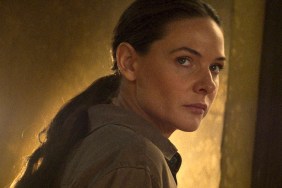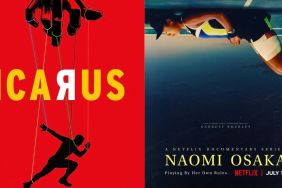Most people who know the work of French actress Audrey Tautou first fell in love with her when she starred in Jean-Pierre Jeunet’s Amelie back in 2001. After that movie, Tautou seemed to be in dozens of French imports, but in recent years she’s been more selective, playing more mature roles like Coco Chanel in Coco Before Chanel and starring in fims such as Delicacy and Beautiful Lies that haven’t gotten nearly as much attention in the States.
Her most recent film and probably most complex role is in Thérèse, based on the 1927 novel “Therese Desqueyroux” by François Mauriac and the final film by Claude Miller, who had been directing French films since the early 70s but who tragically passed away before the film’s Cannes Film Festival premiere in 2012.
Her title character lives in the French countryside, born into a wealthy landowning family, but at an early age, Therese is married to a wealthy landowner, played by Gilles Lellouche, a boorish husband who cares little for his younger wife. Trapped in what’s looking more like a loveless marriage, Therese tries to find ways of escaping only to learn that the Desqueyroux family aren’t going to let her leave their son as easily as she thought.
ComingSoon.net had a nice conversation with Tautou about the film earlier this year when she was in town for Lincoln Center’s “Rendezvous with French Cinema” and with the movie opening in New York City on Friday, August 23, it seemed like a good time to share it with CS readers.
ComingSoon.net: It’s tragic that Claude Miller died before the movie could be released, but he did get to finish the movie, right?
Audrey Tautou: Yeah, he finished the movie. In fact, he passed away a few hours after Thierry Fremaux from the Cannes selection committee told him that his movie would be selected for the festival.
CS: I guess last year when we spoke you’d already filmed this movie, but we didn’t really get a chance to talk about it. I’m not really familiar with the novel so is that fairly well known in France?
Tautou: Yes, yes, very well known. It’s a classic, one of the masterpieces of French literature, yes, so Claude sent me the novel before writing the script because he wanted to know if I’d be interested before writing the script. We wanted to work together for a long time, for ten years, but we hadn’t found the project, and one day he called me and he told me that he had an idea for me, and it was “Therese Desqueyroux” and it was so great for me to have this opportunity to do a part so different and so mysterious. I was very happy that a a director could trust me in a part like that.
CS: Did he give you any idea of the direction he wanted to take with it or did he just give you the novel?
Tautou: No, first he gave me the novel to read it.
CS: How many years ago was that?
Tautou: Well, it was when I was shooting “Beautiful Lies” and it was like four years ago. Yes, I think so.
CS: And you’d never read the novel before?
Tautou: No.
CS: But is it something they teach in school?
Tautou: Yes, yes, because it’s a great portrait of the bourgeoisie in the countryside and the conventions in France of this period, and it’s a great way to see how the place and role of women has evolved during the past century and also to see how so many things haven’t changed in society.
CS: Is it hard to take on the role of a woman that’s so repressed? You’ve played so many strong women such as Coco Chanel and Therese is very repressed.
Tautou: She’s very repressed and very obedient, so all her rebellion stays inside her brain and behind her eyes and the only moments when she manages to escape or manages to do a crazy thing is when she has daydreams, when she imagines that she sets fire to the forest or jumps out of the train, but apart from these moments, she’s just obedient, and she just keeps what she thinks inside her, behind her face. That’s a great part to play.

CS: But it must be tough to try to portray that and all the different facets of the character.
Tautou: Well, I didn’t feel that was really tough, because I felt so close to her, and every thought she had was very clear for me. I had written down an interior monologue besides the scenes. In every scene, I had written every single though, every single line, she would want to shout that she was shutting down, so I felt really close to her.
CS: That’s what I mean. There’s a lot of stuff with her that’s not being said in dialogue, which I thought was very interesting. There’s quite a bit of dialogue in the movie but not from her.
Tautou: Or when she says something you have to see that she thinks the opposite, or that’s what I tried to do. It was important that her thoughts were noisy, you understand? That she has noisy thoughts but not with a lot of talking.
CS: The fantasies are pretty realistic and fairly grim. Some people have fantasies of flying and fantastic things like that, but hers are very dark, and you’re not really aware they’re fantasies as you’re watching them.
Tautou: I think that Claude really wanted to be as close to the intimacy of the characters, and that’s the way he shoots movies and tell stories. He likes to be very close to the essence of humanity with his contradictions and the fact that nothing is white or black but that we are nuances of grey.
CS: It seems like she gets married very fast. She meets the man who’ll become her husband and then they’re married, so in the book does it explain a little more why she married him?
Tautou: Yes, it’s a question of unifying the fortune of two families. The family of her husband is the richest family in the countryside, in this area, and she’s part of the other richest family, so it’s a good deal.
CS: But she doesn’t get a lot of pressure from her parents to marry the guy. She actively decides to marry him.
Tautou: The thing is that you don’t see the big pressure simply because she was educated to become his wife since she was a child, and the scene between her and Anne when they’re teenagers and young women, it’s written that she would have to marry this man.
CS: Right, they knew early on.
Tautou: Yes, it’s something obvious, and the weakness of Therese is not to have the bravery to confront her father, but it’s also because she doesn’t know herself very well, so she doesn’t feel confident enough to know and to be sure that she’s not made for this life. It’s a movie also about the fact that sometimes it takes many years to know yourself.
CS: Nowadays, if something like this happened, they’d be divorced or separated but back then, it’s all about image and the family expectations.
Tautou: Of course, but nowadays in our societies, women are much freer and they have the freedom to choose their life and it’s not a crime to live your life with a full independence. There’s also this question that as a woman at that time, if you didn’t want to get married or if you refused this marriage or if you moved to the city, you were rebellious. It’s not for everybody and you have to be heroic to do that.
CS: Because you’re going against society’s expectations
Tautou: Yes, I think that’s what I really liked with Therese and that’s how we’re linked together, because I perfectly understand that she’s not a rebellious women, you see what I mean? She’s not going to say to her father, “I’m leaving and getting divorced.”
CS: And you cheer her on when she tries to poison her husband. I’m sure a lot of women must love the book because her husband is a jerk and he kind of deserves what happens to him. It’s interesting how that turns outwhen she does what many women might have done
Tautou: The thing is that I think she doesn’t premeditate this crime. She just dives into this crime by curiosity and also because she was suffocating in this life and she had no future so by doing that, I would say she was the creator of her future. She didn’t know where this would take her, but she was the driver of her destiny. She’s the master of her own future, even though it’s dangerous.
CS: Even though he didn’t die, she almost seems to be persecuted more just for even thinking of poisoning him.
Tautou: No, but I’m not sure she wanted him to die. I just think that she wanted to have a different destiny, a different future, and she thought it would be the way for her to escape and to find some freedom, but I don’t think she was hoping for a special result, except having the life she was dreaming of.

CS: Seeing her fantasies, it seems like she’s trying to find a way to be free but she doesn’t know how to get free.
Tautou: Yes, exactly, because the number of possibilities for her are so tiny, you see? She can’t divorce, she can’t leave, she doesn’t have money
CS: You’ve been very busy since I’ve seen you and you have a lot of choices in terms of movies
Tautou: Yes. (laughs)
CS: It’s interesting that the Michel Gondry movie you did, “Mood Indigo,” is coming out in France next month. (Reminder: This interview was conducted in March.)
Tautou: Yes, at the end of April.
CS: It’s been rather secretive since it hasn’t played at many festivals and is just being released, which is rather odd.
Tautou: But I think it only comes out in France, right? But not in America.
CS: No, but I would think a movie with you and Romain Duris and Omar Sy directed by Michel Gondry would play festivals and wait for after Cannes. Have you seen it already?
Tautou: No, not yet. I was supposed to see it just before coming to New York but it was not totally finished, so I can’t wait to see it because I think it’s crazy and unrealistic.
CS: How did “Chinese Puzzle” turn out? Since I saw you last, I’ve spoken to Kelly Reilly and Romain so I’m curious to hear your take on how it turned out.
Tautou: Oh, it was great to refind my part. Martine, she’s so funny and hopeless (giggles). I really like her and it was great to shoot with the little boy who plays my son ten years ago, so now he’s a young teenager, so that was great and it was great to be in New York and to refind Cecile de France and Kelly Reilly and Romain and Cedric. I love being in New York, so for me, it was a gift.
CS: I live in Chinatown and I think he shot some of it in my neighborhood so I was really excited to see that.
Tautou: Yeah, yeah, yeah, we shot a lot in Chinatown.
CS: Is there a lot more English in it than the other movies or is it still mainly in French?
Tautou: I think it’s mainly French but there’s more English.
CS: Do you have anything else coming up?
Tautou: No, not for the moment. I don’t have any plans so I’m doing my press.
CS: Do you like doing movies like this that are a little darker? We’re so used to seeing you doing lighter romantic comedies, but do you like switching things up?
Tautou: Of course, I like different experiences. I just hope I will have the opportunity to explore different types of parts, but I’m not the one who has the clue.
CS: You’re not able to drive your own fate basically.
Tautou: Yeah, to stimulate the imagination of directors but of course, I like comedies and I’m a very eclectic audience and I think that as an actress, I’m the same. I don’t have any prejudices and nothing really scares me.
CS: When you’re working on a movie like this that’s so down, is it hard to get out of that head? A movie like “Chinese Puzzle” you can have fun on set between takes but a movie like this seems like it would be harder to do that.
Tautou: Yeah, but the funny thing is that just because you shoot a comedy that doesn’t mean you have fun on set, and it’s not because you shoot a drama that you are completely depressed while you’re shooting. Actually, on Claude Miller’s movie, it was wonderful shooting and it was very joyful and cool and simple and nice and full of tenderness. It was a great, great shoot but it was also because of Claude and his energy and the way he was with the actors. He was such an elegant character so it was a wonderful shoot and very light.
Thérèse opens in New York City at the Angelika and at the Elinor Bunin Munroe Film Center today, August 23.









